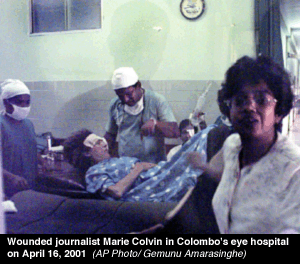State media launch smear campaign against Tamil journalist
Your Excellency: The Committee to Protect Journalists (CPJ) is deeply concerned about the security of Dharmeratnam Sivaram, veteran journalist and editor of the TamilNet Web site. Over the past two weeks, state media have featured articles accusing Sivaram of being a spy for the rebel Liberation Tigers of Tamil Eelam (LTTE)–a charge that seriously endangers him and his family.
CPJ welcomes lifting of censorship, urges press access to conflict areas
Your Excellency: The Committee to Protect Journalists (CPJ) welcomes your decision to lift censorship restrictions on the Sri Lankan media. We hope that your administration will now work to lift other obstacles that prevent reporting on the country’s long-running civil war.
CPJ welcomes lifting of censorship, urges press access to conflict areas
New York, June 6, 2001 — In a letter sent today to Sri Lankan president Chandrika Bandaranaike Kumaratunga, CPJ welcomed her government’s recent decision to lift censorship restrictions on the Sri Lankan media. The letter also urged the president to lift access restrictions that still impede reporting on the country’s long-running civil war. In addition…
CPJ condemns smoke bomb attack on weekly paper
New York, May 25, 2001 — The Committee to Protect Journalists (CPJ) condemns the recent smoke bomb attack on the Sinhala-language weekly newspaper Ravaya, and urges the government to issue a prompt and full report on the status of the police investigation that is now underway. “Attacks against journalists in Sri Lanka are occurring with…

Government Threatens to Impose Additional Restrictions on Foreign Correspondents
New York, April 17, 2001 —The Committee to Protect Journalists (CPJ) is deeply concerned about the injuries suffered by Marie Colvin, an award-winning American journalist who works for the British newspaper The Sunday Times. Colvin, who was caught yesterday in a skirmish between rebel forces and government troops, received four shrapnel wounds in her head,…
Sri Lanka: Reporter threatened after covering alleged rape of jailed Tamil women
Your Excellency: The Committee to Protect Journalists (CPJ) is deeply concerned about the security of A.S.M. Fasmi, a reporter for the Tamil-language newspaper Thinakkural. Fasmi, who is based on the northern island of Mannar, says he has been detained, interrogated, and threatened repeatedly with death since he reported on the alleged rape of two Tamil women detained by local security forces last month.
Reporter’s murder still unsolved
Your Excellency: The Committee to Protect Journalists (CPJ) requests information about the status of the investigation into the murder of Mylvaganam Nimalarajan, a Jaffna-based journalist who was killed in October 2000. Nimalarajan covered the civil war for various news organizations, including the BBC’s Tamil and Sinhala-language services, the Tamil-language daily Virakesari, and the Sinhala-language weekly Ravaya.
Attacks on the Press 2000: Preface
By Peter ArnettSHE STOOD DEFIANTLY IN THE CRAMPED QUARTERS OF ISTANBUL’S BEYOGLU CRIMINAL COURT at high noon of a hot midsummer day. The slight, dark-haired Nadire Mater had a message for the court and for the two dozen Turkish reporters and photographers who had gathered to hear her. “The truth is plain to see. Banning…
Attacks on the Press 2000: Introduction
By Ann CooperIN THE COMMUNITY OF JOURNALISTS WHO HAVE CHRONICLED the past decade’s worst wars, the news last May was devastating. Two of the world’s most dedicated war correspondents, Kurt Schork of Reuters and Miguel Gil Moreno de Mora of The Associated Press, were killed in a rebel ambush in Sierra Leone, a country where…
Attacks on the Press 2000: Asia Analysis
DESPITE PRESS FREEDOM ADVANCES ACROSS ASIA IN RECENT YEARS, totalitarian regimes in Burma, China, North Korea, Vietnam, and Laos maintained their stranglehold on the media. Even democratic Asian governments sometimes used authoritarian tactics to control the press, particularly when faced with internal conflict. Sri Lanka, for instance, imposed harsh censorship regulations during the year in…